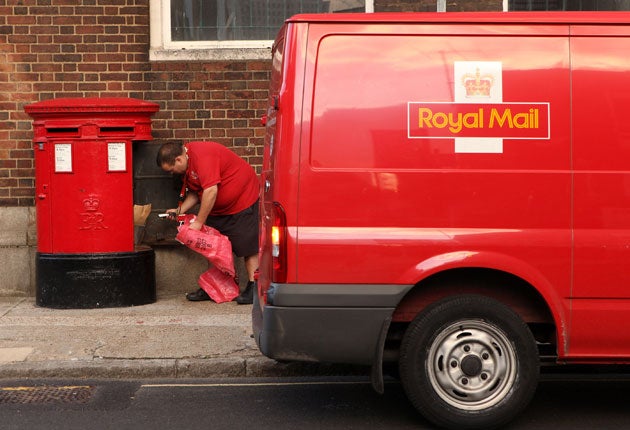Royal Mail will hire 30,000 extra workers to beat strike
Temporary Christmas staff will be brought in early to deal with planned stoppages

Royal Mail bosses have escalated their dispute with staff ahead of a national strike by taking on tens of thousands of temporary workers to "keep the mail moving" during the stoppage.
Union leaders reacted with fury yesterday after it emerged that the Royal Mail was planning to take on double its usual number of seasonal staff, and earlier than usual, to help with the Christmas rush this year.
Labour MPs warned that the move could turn the dispute into a full-blown industrial crisis, and urged ministers to intervene immediately – or at least to encourage both sides to turn to the Advisory Conciliation and Arbitration Service (Acas).
Days after the Communication Workers Union (CWU) confirmed two nationwide strikes this week over pay, working conditions and reform, the state-owned firm will today announce that it is recruiting up to 30,000 temporary workers to cope with the action – and the Christmas rush. Royal Mail claims 85,000 people have already applied for vacancies. The company insisted it did not plan "to bring people in to do our postmen's work when they are out on strike, but to make sure that we have people to help clear any backlogs between strikes".
However, the dramatic move was in line with an aggressive strategy for dealing with the strike laid out in a leaked document last week. The "Strategic Overview" made clear the need to minimise the impact of the strikes and limit the volume of mail and backlogs as part of a campaign to increase pressure on the CWU to accept planned changes.
It also emerged yesterday that Royal Mail is establishing five additional dedicated sorting centres to deal with the backlog of mail – and 5,000 managers throughout the UK will be sorting and delivering mail during any strike action. About 100 Royal Mail managers have already been delivering mail on Sundays to help to clear the backlog. They have received no extra money and used company vans to deliver letters and packages in areas where local strikes have caused the most disruption, including London.
"We are continuing to urge the union to halt its appalling and unjustified attack on customers," said the Royal Mail Group chief executive, Adam Crozier. "At the same time, we are absolutely determined to do everything we can to minimise delays to customers' mail, especially in the run-up to Christmas. Every year, Royal Mail recruits thousands of additional, fully vetted, temporary staff as part of the operation that successfully delivers the Christmas mail. This year we'll have twice as many people on board, and we'll have them in place much earlier."
But, amid complaints about the "provocative" gesture by the management, the CWU complained that the Royal Mail should be concentrating its efforts on thrashing out a lasting settlement with the workforce. A CWU spokesman said: "We're disappointed that Royal Mail appears to be more interested in sidelining the views and concerns of its staff than reaching an agreement to bring this dispute to an end. Instead of spending vast sums of money on untrained temporary workers, we urge the Royal Mail to engage in talks to reach an agreement to get the permanent staff back to work. CWU remains available for talks to avoid a strike."
The Labour MP John Grogan who helped to lead the parliamentary campaign against the part-privatisation of the Post Office said the mass recruitment drive was a worrying sign that the two sides were moving further apart. He said: "This will reinforce the feeling on Labour benches that the Government cannot stand on the sidelines while this dispute is escalating. It urgently needs to get Acas in there or convene talks itself, because this is developing into a dispute of the proportions of the 'winter of discontent'."
The reference to bitter disputes of the past will be unwelcome to the Secretary of State for Business, Lord Mandelson, as he attempts to maintain stable industrial relations during a difficult period for the economy.
The CWU general secretary, Billy Hayes, yesterday hinted that there could be more stoppages to come, insisting that he was "not ruling anything out". And, in another uncomfortable throwback for the Government, he suggested that he was in a stronger position than the former miners' leader Arthur Scargill in the 1980s, because the service had a greater impact on the economy.
The 24-hour strikes will begin on Thursday, with a stoppage by mail-centre staff and drivers. Delivery and collection staff will strike the following day, in a move calculated to maximise the impact of the action.
Mr Hayes added: "Mail volumes increase by three times in the run-up to Christmas. The thing about mail is that it's not something you can stockpile."
But mail bosses will today make clear that they have put together comprehensive plans to reduce the impact of what they call "irresponsible" strikes.
Royal Mail in numbers
121,000 Number of CWU members in the Royal Mail Group workforce balloted on strike action over job security and working conditions.
61,623 Members who supported a strike (out of a total of 80,830 who voted).
10% Annual decline in the number of letters and parcels delivered by Royal Mail (at a cost of £170m a year).
Join our commenting forum
Join thought-provoking conversations, follow other Independent readers and see their replies
Comments
Bookmark popover
Removed from bookmarks